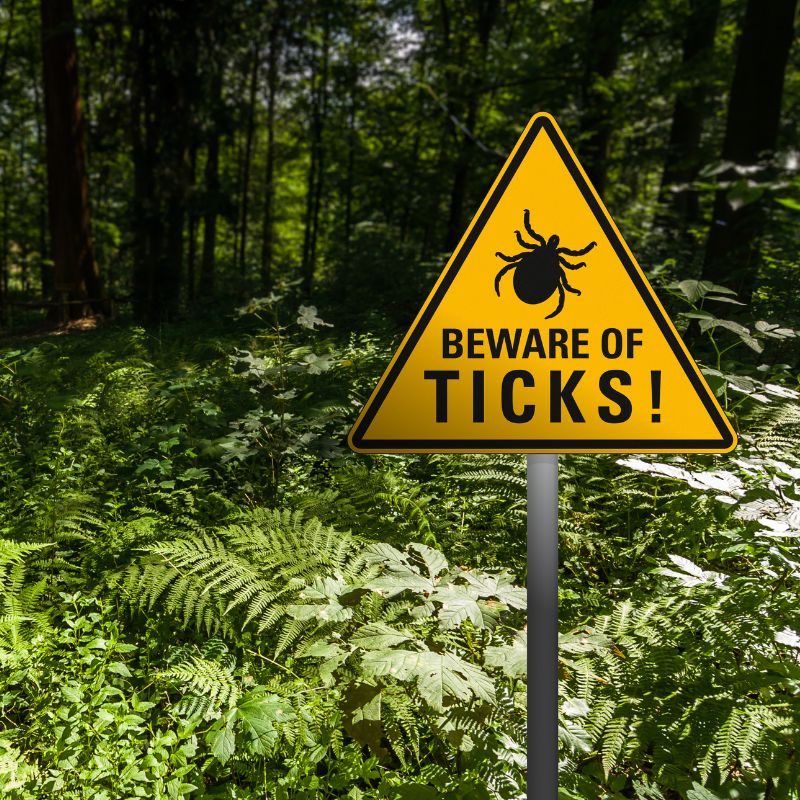Have you ever spent an afternoon getting lost in the great outdoors only to find yourself a host to a tiny unwelcome guest? Ticks, those eight-legged hitchhikers, latch on for a blood meal, leaving us itchy and a little concerned.
If you’re the type of person that somehow ends up with the most mosquito bites or tick bites and feel like you’re just a walking target for all of nature’s blood suckers, you might be wondering what it is that makes you the most delectable buffet option.
Mosquito Solutions is here to ease your worries, and more importantly, equip you with the knowledge and tools to fight back. Look for pest spraying services in or near Suffolk County? Give us a call or reach out online – we can help.

How Do Ticks Choose Their Host?
Contrary to popular belief, ticks aren’t picky when it comes to choosing their host. They rely on the following factors in order to get to their next meal:
- Chemical Cues: Ticks are highly sensitive to the carbon monoxide we exhale and other body odors we emit. These act like dinner bells, alerting the tick to a warm-blooded creature nearby.
- Heat & Moisture: Ticks are drawn to the body heat animals and humans give off, along with the increased moisture levels around a potential host.
- Vibrations: The vibrations caused by walking or brushing through vegetation can also attract ticks, letting them know a potential host is approaching.
- Shadow Detection: Not all species of ticks can detect shadows…but the ones that can are sensitive to changes in light, alerting them of a passing animal or person.
When a tick detects any one of these factors, they’ll climb to the top of the nearest blade of grass or shrub, and extend their front legs outward, like grappling hooks. Once they make contact with their host, the tick will firmly grasp onto fur, feathers, or clothing with all eight legs.
Before you know it, these hungry suckers are latching on and enjoying a nice, free meal.
Who Is More Likely to Get Ticks?
You might be wondering if there’s anything that makes you more susceptible to tick bites than others. While there have been some studies that show ticks prefer female hosts over male hosts, the only factors that definitively increase your chances of being bitten by a tick include:
- Spending Time in Tick Habitats: If you spend a lot of time outdoors hiking, camping, hunting, or gardening in areas with tall grass, brush, wooded areas, or around wildlife, you are more likely to become a host to ticks.
- Having Pets: Pets, especially dogs, can pick up ticks outdoors and bring them inside, increasing the chance of tick encounters for everyone in the household.
- Living in High Tick Population Areas: Certain regions have a higher prevalence of ticks due to climate and environmental factors. Checking tick maps for your area can be helpful, too.
- Not Performing Tick Checks: Regularly checking yourself, your children, and your pets for ticks after spending time outside is important for early detection and removal.
How To Prevent Tick Bites
When you enjoy spending time in nature, things like ticks can’t always be avoided. That said, there are some things you can do to help lower the risk of tick bites – without spoiling an otherwise fun, adventurous day.

- Use DEET Repellent: Apply an EPA-registered insect repellent containing DEET to exposed skin.
- Dress Defensively: Wear light colored long sleeve shirts and pants when venturing out into tick territory. Light colored clothing will help you find ticks easier. You can also tuck your pants into your socks and your shirt into your pants to prevent ticks from crawling up.
- Maintain Your Yard: Because ticks prefer tall grass, bushy areas, and wooded zones, it’s important to keep your lawn mowed and trim back any overgrown shrubs around your house.
- Perform Daily Checks: Get into a good habit of doing thorough body checks on yourself and your children. Some common tick hiding spots include the armpits, behind the ears, in the groin area, and around the scalp.
- Invest in Tick Prevention for Pets: If you have pets you’re concerned about, talk to your veterinarian about tick prevention medication, especially if you live in a high-risk area.
Create a Strong Line of Defense with Tick Spraying from Mosquito Solutions
While ticks are sneaky hitchhikers, a little knowledge and preparation can go a long way. If you have any concerns about ticks in and around your home, give Mosquito Solutions a call today to discuss spraying your yard for ticks. Tick control treatments create a protective barrier around your property, minimizing the chance that these bloodsuckers (and all of their blood sucking friends) latch onto you or your pets in the first place.
Don’t let the fear of ticks hold you back from enjoying the great outdoors. Call Mosquito Solutions at 631-528-2029 or request an appointment online today.

Recent Comments